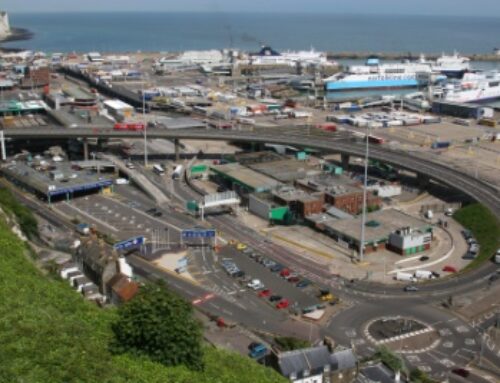Contractor appointed as foreign truck tax launch looms
 Northgate Public Services has been appointed to develop and run the foreign operator payment system for the HGV Road User Levy by the Department for Transport. The contract, which will initially run until 2019, was awarded following a government tender process, and incorporates the design, creation, financing, operation and maintenance of the system.
Northgate Public Services has been appointed to develop and run the foreign operator payment system for the HGV Road User Levy by the Department for Transport. The contract, which will initially run until 2019, was awarded following a government tender process, and incorporates the design, creation, financing, operation and maintenance of the system.
The new time-based charge will apply to all vehicles with gross weights of 12 tonnes or more that use British roads – irrespective of their country of registration – from 1 April next year.
The scheme cannot specifically discriminate against foreign operators under EU law, but British hauliers will pay the charge when they purchase their VED discs, and the VED discs will be discounted so the total paid for most British operators’ vehicles will be the same, or no higher than £50 more than it was before (Transport Operator 11).
The foreign operator payment system will allow drivers or operators to pay the levy prior to entering the country, including via telephone, Internet or at point-of-sale terminals.
As part of the system, Northgate will maintain an electronic database containing details of all foreign trucks for which the levy has been paid. This database will be accessible by British enforcement officials at the roadside, allowing vehicles’ registration numbers to be checked against the data held, and allowing the authorities to identify those operators who have failed to pay the charge. Tax discs will not be issued to foreign-registered trucks.
Announcing the appointment, roads minister Stephen Hammond said: “Getting the foreign operator payment system right will be crucial to the success of the levy. The system will be easy for foreign carriers and their drivers to access and straightforward to use. Its design also sends an important message to those foreign operators who think about avoiding paying. If you don’t pay, or underpay, you will be caught and face a £300 fine.”
David Meaden, chief executive of Northgate Public Services, added: “The foreign operator payment system will provide a simple and effective means of ensuring that foreign hauliers who use the UK road network contribute to the cost of its upkeep. By re-purposing existing technology, the programme can be delivered in a shorter timescale and with lower costs and risk than would otherwise be possible.”
Enforcement of the road user levy will be led by VOSA in England, Scotland and Wales, and the Driver and Vehicle Agency in Northern Ireland, with police providing additional enforcement. Non-payment or underpayment will be a criminal offence, and subject to a £300 fixed penalty – payable on the spot for foreign-registered trucks.
The Department for Transport said about 260,000 UK-registered trucks would come into scope of the charge, while about 130,000 eligible foreign-registered trucks enter the UK each year, making a total of about 1.5 million journeys.
The system will cost the taxpayer between £2.5 million and £5 million to set up in the first year. Following that, revenues from foreign hauliers paying into the system will generate annual surpluses of £18.7 million to £23.2 million.
Foreign hauliers will pay £10 a day or £1,000 a year to drive on British roads with a 40-tonne truck. Lighter vehicles pay proportionately less. The fees are the highest that Britain can impose under EU law.
Meanwhile, the Department for Transport is currently seeking views from industry, trade associations, enforcement agencies and others on two areas on which it plans to legislate regarding the new tax.
The department is proposing a fixed penalty (or for those based outside the UK, a penalty deposit) of £300 for those failing to pay the appropriate levy amount for a vehicle – which it says is in line with transport-related offences of a similar nature, such as breaching drivers’ hours rules or overloading – and is asking for views on this proposed sum. It is also inviting interested parties to highlight any concerns about the application of penalties or penalty deposits in relation to the levy.
The second area being consulted on is a proposed small, technical amendment to the Road Vehicles (Construction and Use) Regulations 1986, which aims to bring into line the weight bands used to calculate Vehicle Excise Duty (VED) with those setting minimum rates of VED by a European directive.
Claiming the change would be unlikely to have any “practical impact”, the DfT explained: “The change will mean that a vehicle with a particular plated weight will in future be able to be loaded up to but not including that weight, whereas at the moment it can be loaded up to and including that weight.
“For example, a vehicle plated at 21,000kg can currently be loaded to exactly 21,000kg. In the future, it can be loaded to less than that amount, that is, around 20,999.99kg.”
The consultation, which closes on 7 November, can be accessed here.











